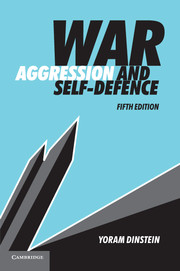Book contents
- Frontmatter
- Contents
- Introduction to the fifth edition
- From the introduction to the first edition
- Table of cases
- Table of treaties
- Table of Security Council resolutions
- Table of General Assembly resolutions
- Abbreviations
- Part I The legal nature of war
- Part II The illegality of war
- Part III Exceptions to the prohibition of the use of inter-State force
- Index of persons
- Index of subjects
Introduction to the fifth edition
Published online by Cambridge University Press: 05 June 2012
- Frontmatter
- Contents
- Introduction to the fifth edition
- From the introduction to the first edition
- Table of cases
- Table of treaties
- Table of Security Council resolutions
- Table of General Assembly resolutions
- Abbreviations
- Part I The legal nature of war
- Part II The illegality of war
- Part III Exceptions to the prohibition of the use of inter-State force
- Index of persons
- Index of subjects
Summary
This is a completely updated edition of a book originally published in 1988 and last revised at the end of 2004. In the few years that have elapsed since the fourth edition was issued, world events have led to the sharpening of debates over several of the topics examined in the present volume. These debates touch upon a raft of controversial questions relating to, e.g., the adequacy of the legal tools provided by the Charter of the United Nations in the face of aggression; judicial review of binding decisions of the Security Council; unilateral ‘preemptive’ military action against terrorist threats; armed attacks by non-State actors; extraterritorial law enforcement; and the degree of effective control required over acts of de facto organs of States.
An update of the book is anyhow called for in light of new developments. The International Court of Justice has rendered weighty decisions, especially in the Armed Activities and Genocide proceedings. Other tribunals have also made their contributions to the case law, for instance in an Award of the Eritrea Ethiopia Claims Commission devoted exclusively to the jus ad bellum. Most significantly, the crime of aggression has been defined for the purposes of the International Criminal Court (although the actual exercise of jurisdiction by the Court is deferred until a future date). The legal literature on war, aggression and self-defence (which, prior to the Nicaragua Judgment of 1986, was desultory) is currently growing in prodigious proportions.
- Type
- Chapter
- Information
- War, Aggression and Self-Defence , pp. xiiiPublisher: Cambridge University PressPrint publication year: 2011



